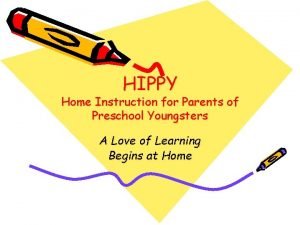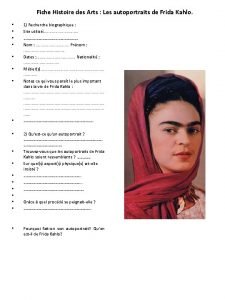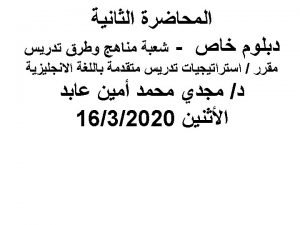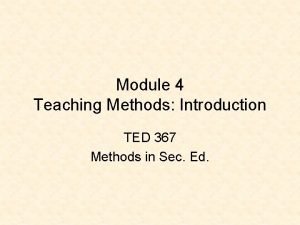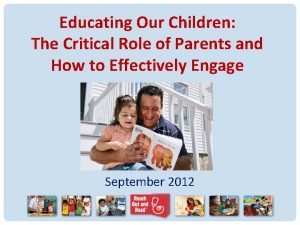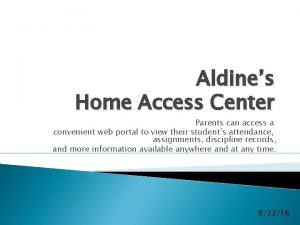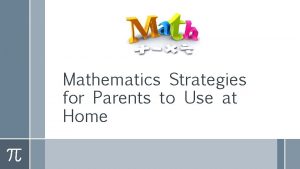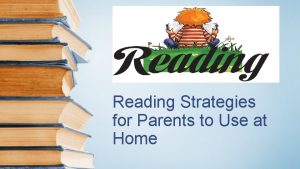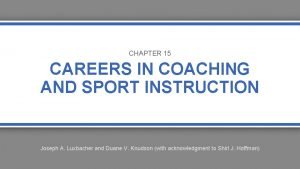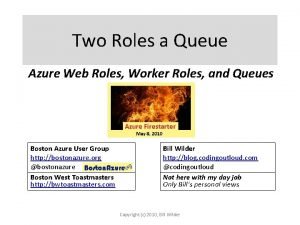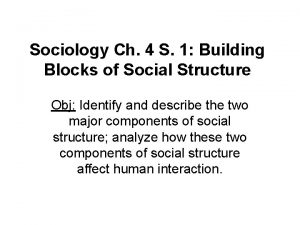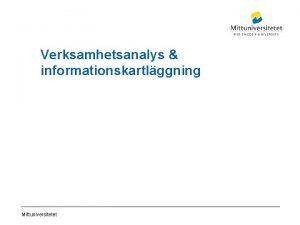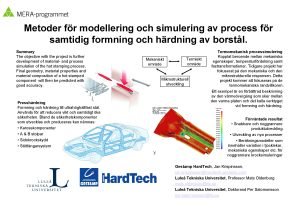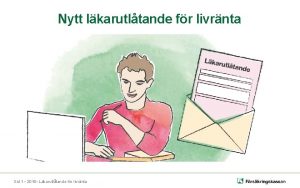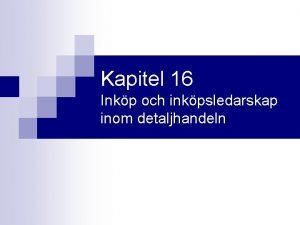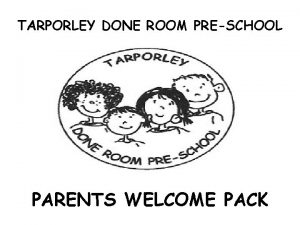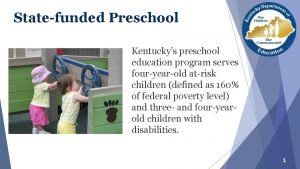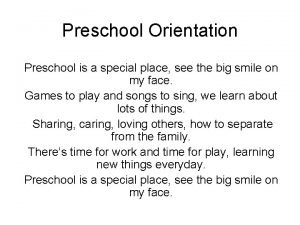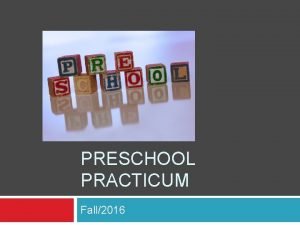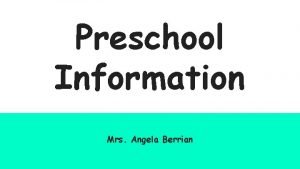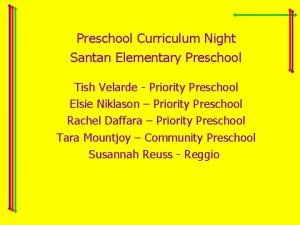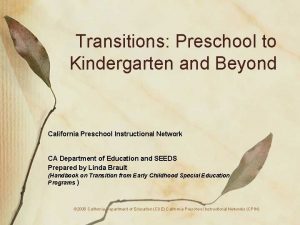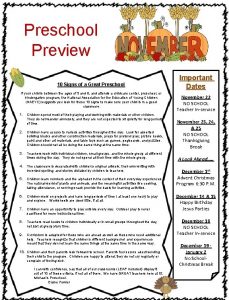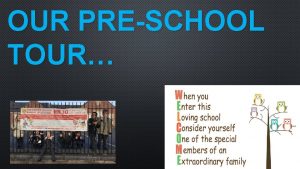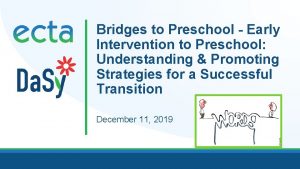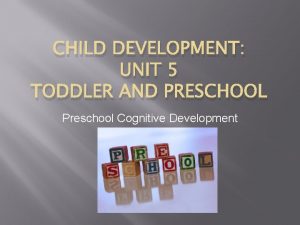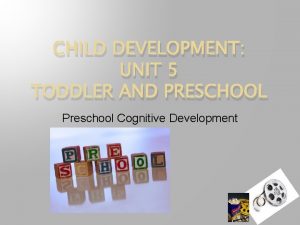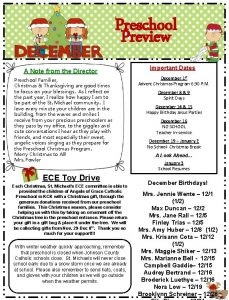Home Instruction for Parents of Preschool Youngsters Role






































- Slides: 38

Home Instruction for Parents of Preschool Youngsters Role Play for HIPPY Staff

Participants Will…. • Define Role Play as the HIPPY method of instruction • Describe each component of the role play cycle • Identify the purpose and use of all role play materials • Demonstrate all Keys to Effective Role Play • Demonstrate the 3 C’s of Role Play

A Method of Instruction Role Play Provides…. • Opportunities for learning • Growth for parents • Consistency in teaching and learning

What is Role Play? Role play involves… • 2 partners – – Coordinator/ Home Visitor / Parent / Child • 2 roles – Parent / Child • Taking turns • Switching roles

Advantages of Role Play • For Coordinators • For Home Visitors • For Parents

The Role Play Cycle Coordinators and Home Visitors role play HIPPY activities at weekly Staff Training Home Visitors complete HIPPY activities with Practice Child Parent and Home Visitor review HIPPY activities from the previous week Home Visitor role plays HIPPY activities with Parent completes HIPPY activities with Child Handout

Round Robin Role Play • Occurs weekly • Ensures consistent delivery of instruction • Familiarizes staff with activities • Provides opportunities for staff development • Coordinator’s role • Home Visitor’s role

Materials and Supplies Coordinator Home Visitor • Meeting agenda and signin sheets • Coordinator’s Guide • Weekly Guidance • HIPPY story books • HIPPY weekly activity packet • Writing materials – pens, pencils, markers, sticky notes (props) • Home Visitor’s Guide • HIPPY story books • HIPPY weekly activity packet • Sample packet • Props • Home Visitor tip sheets

The Sample Packet is ALWAYS: • A fresh packet with pieces cut out • Prepared in advance • Used to role play with staff and parents • Created for each week of the HIPPY curriculum

The Sample Packet is NEVER: • Glued, colored or otherwise marked • Belongs to the home visitor’s practice child • Includes “answers” • Contains any photocopied pages

The Sample Packet: Frequently Asked Questions • “What is a sample packet? ” • “How do I use a sample packet? ” • “Do I need a sample activity packet for each week of the curriculum? ” • “Who makes the sample packet? ” Handout

The Sample Packet: Frequently Asked Questions • “Should the sample include coloring, marking or writing? ” • “Why can’t I use my child’s packet as the sample? ” • “Are there variations of the standard activity packet? ” • “When should a sample activity packet be made? ” Handout

12 Keys To Successful Role Play Handout

The 12 Keys To Successful Role Play Advisory Board 1. Review the Tips in the Activity Packet.

The 12 Keys To Successful Role Play 2. Use a Sample Packet to Role Play.

The 12 Keys To Successful Role Play 3. Take turns taking the role of “parent” and “child”.

The 12 Keys To Successful Role Play 4. Answer spontaneously when playing the child.

The 12 Keys To Successful Role Play 5. Model all activities.

The 12 Keys To Successful Role Play 6. Read the directions (contained in parenthesis) silently before beginning the role play when assuming the teacher/parent role.

The 12 Keys To Successful Role Play 7. Read the “script” to the child.

The 12 Keys To Successful Role Play 8. State the potential response, which follows a hyphen, regardless of the “child’s” answer.

The 12 Keys To Successful Role Play 9. Never tell the child “no” or that they are wrong if they answer incorrectly.

The 12 Keys To Successful Role Play 10. Provide the child with periodic praise.

The 12 Keys To Successful Role Play 11. Provide the title, author and illustrator at the initial reading of each story book.

The 12 Keys To Successful Role Play 12. Ask the parent to identify words in the story book that may be unfamiliar to their child.

The 3 C’s of Role Play Confirm Complete Correct • Offers a supportive response to an incorrect answer • Affirms the child’s effort • Creates a positive and safe learning environment Handout

Round Robin Role Play Training Activity HIPPY Curriculum Year 1, Week 1

Thinking it Through The following slides contain questions that will help you think about and apply what you’ve learned. The correct answer(s) will always appear when the mouse is clicked These questions can also be used as an option quiz. Print the quiz handout to use them in quiz format, Handout

A sample packet should not include: A) cut outs for demonstrating activities B) writing, marks or answers C) crayons, scissors and glue D) props and other needed materials Submit Clear

Rank the phases of the Role Play cycle: • First • Parent completes HIPPY activities with Child • Second • Coordinator leads Role Play with Home Visitors • Third • Home Visitor shares questions from Role Play with parent at staff meeting • Fourth • Home Visitor completes Role Play with parent • Fifth • Home Visitor completes HIPPY activities with practice child

It’s OK to use my child’s activity packet as a sample. TRUE FALSE Why? • Your child’s work is their own. • A clean sample packet avoids setting expectations or standards for what a child’s work “should” look like. • As your child completes the packet each week, they cut, color, glue and use up much of it. • The role play is less effective and feels unnatural if all the answers are written out.

Which materials will a Home Visitor need for role play during the weekly staff meeting? A) HIPPY story book B) sample activity packet and props C) calendar D) HIPPY activity packet E) hot coffee F) Home Visitor tip sheets

Which is the most important Key to Successful Role Play? A) 1. Review the tips in the activity packet. B) 5. Model all activities. C) 9. Never tell the child “No”. D) 10. Provide the child with periodic praise. E) This is a trick question – they are all important.

Role play allows parents an opportunity to become _________ for their children. registered voters strict disciplinarians life long learners forceful advocates effective first teachers careful planners

Choose the best answer. Role play involves…… A. ) The home visitor switching roles with the coordinator B. ) 1 parent and 1 child C. ) 2 partners, taking turns and trading roles D. ) The home visitor always role playing as the parent and the parent always role playing as the child

Match the parent’s response to the child’s answer: Confirm Complete Correct If the child has No Response or says “I don’t know the answer” or Gives an answer that does not fit the question, the parent will responds by only saying the anticipated response. When the child Responds and the answer is Correct (matches the anticipated response listed in the activity packet), the parent Repeats the answer. When the child Responds with part of the correct or alternate correct answer, the parent Repeats the child’s answer and provides any missing details.

When role playing, it’s important to sometimes answer incorrectly when playing the part of the child. TRUE FALSE Why? • The “child’s” answers should represent what a child of that age might say. • This will assist the parent in anticipating their child’s response. • It creates an opportunity to teach the parent how to respond to an incorrect answer.

Never tell the child ______. “Wait. ” “I like what you did. ” “You’re thinking hard. ” “No. ” “Let’s do it together. ” “I can’t hear you. ”
 Hippy home instruction for parents of preschool youngsters
Hippy home instruction for parents of preschool youngsters Home interaction program for parents and youngsters
Home interaction program for parents and youngsters Frida kahlo tableau arbre généalogique
Frida kahlo tableau arbre généalogique Parents parents
Parents parents Fiche histoire des arts frida kahlo
Fiche histoire des arts frida kahlo Individualized instruction vs differentiated instruction
Individualized instruction vs differentiated instruction Direct vs indirect instruction
Direct vs indirect instruction Parents a critical role in helping
Parents a critical role in helping Hac aldine.
Hac aldine. Math strategies for parents to use at home
Math strategies for parents to use at home Reading strategies for parents to use at home pdf
Reading strategies for parents to use at home pdf Some yesterday
Some yesterday Which is not a role for sport instruction professionals?
Which is not a role for sport instruction professionals? C# azure worker role example
C# azure worker role example Statuses and their related roles determine
Statuses and their related roles determine Krappmann symbolischer interaktionismus
Krappmann symbolischer interaktionismus Come home come home jesus is calling
Come home come home jesus is calling She said that, home economics stands for the ideal home.
She said that, home economics stands for the ideal home. Perbedaan home care dan home visit
Perbedaan home care dan home visit Oak springs rv park
Oak springs rv park Home sweet home: survive
Home sweet home: survive South carolina mobile home parks for sale
South carolina mobile home parks for sale Let's go to my house let's go today
Let's go to my house let's go today Unit 3 home sweet home
Unit 3 home sweet home Jr rabbin imam pretre
Jr rabbin imam pretre Aarti home care
Aarti home care Shingelfrisyren
Shingelfrisyren Ledningssystem för verksamhetsinformation
Ledningssystem för verksamhetsinformation Typiska novell drag
Typiska novell drag Borstål, egenskaper
Borstål, egenskaper Tack för att ni har lyssnat
Tack för att ni har lyssnat Läkarutlåtande för livränta
Läkarutlåtande för livränta Texter för hinduer tantra
Texter för hinduer tantra Centrum för kunskap och säkerhet
Centrum för kunskap och säkerhet Inköpsprocessen steg för steg
Inköpsprocessen steg för steg Påbyggnader för flakfordon
Påbyggnader för flakfordon Strategi för svensk viltförvaltning
Strategi för svensk viltförvaltning Sura för anatom
Sura för anatom Egg för emanuel
Egg för emanuel
